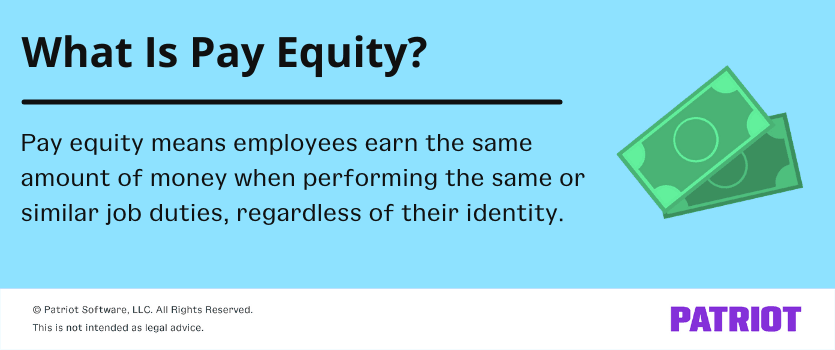It’s illegal to pay different wages for the same job based on race, sex, gender expression, or national origin. But, pay equity in the workplace is sometimes still a problem. What does pay inequality look like? On average, a woman in the U.S. makes $0.83 for every $1.00 a man earns.
Pay inequality doesn’t just affect women in the workforce; it affects all types of workers across the country, regardless of industry. Pay equity can help level the paying field (so to speak). Read on to learn more about pay equity.

What is pay equity?
Internal pay equity means employees earn the same amount of money when performing identical or similar job duties, regardless of their identity. Pay equity covers wages and other forms of compensation, such as bonuses, overtime, benefits, and opportunities for advancement.
Pay equity protects employees from unfair reductions in wages based on their:
- Age
- Race
- Gender
- Disability
- National origin
- Sexual orientation
Pay equity doesn’t mean that all employees receive the same pay. Factors like education, work experience, performance, and job location may change employees wages. Generally, pay equity efforts seek to correct differences in pay between the same or similar jobs and situations.
What U.S. laws have led to greater pay equity?
The pay equity that employees enjoy today exists because of laws like:
- The Equal Pay Act: The Equal Pay Act requires that workers earn equal pay for equal work regardless of their gender. This law covers all forms of pay, including bonuses, overtime pay, salary, and stock options.
- Title VII: Title VII, also known as the Civil Rights Act, makes it illegal for an employer to discriminate against someone because of their race, color, religion, sexual orientation, gender identity, and national origin. It also makes it illegal for employers to retaliate against employees if they complain about discrimination, file a charge of discrimination, or serve as a witness in an employment discrimination investigation or lawsuit.
- ADEA: The Age Discrimination in Employment Act makes it illegal to discriminate against people aged 40 or older. The law prohibits discrimination in all aspects of employment, including things like hiring, firing, pay, promotions, and layoffs.
- ADA: The Americans with Disabilities Act makes it illegal to discriminate against individuals with a disability in all aspects of employment, including pay, hiring, firing, promotions, and benefits.
Several states and cities have also passed pay equity laws. Check in with your state or city to see what pay equity laws affect your business.
Pay equity laws by state and locality
Even with federal pay equity laws in place, there are still situations in which pay inequality persists. Cities and states across the country have their own laws to help promote pay equity.
Some recent laws include:
- Pay transparency
- Pay data reporting
- Salary history bans
1. Pay transparency
Pay range disclosure laws require employers to provide job applicants and employees with salary ranges for specific positions. Employers must provide this information when requested, when offering a job, or after an interview. Some pay range disclosure laws require employers to provide salary ranges on job postings.
A growing number of states have pay transparency laws, including:
- California
- Colorado
- Connecticut
- Maryland
- Nevada
- Rhode Island
- Washington
2. Pay data reporting
Pay data reporting laws require employers to report data on employee pay and hours worked to the appropriate organization. This information may be organized by establishment, job category, and worker demographics. Generally, pay data reporting laws help the state understand how employers handle pay equity.
Both Colorado and New York have pay data reporting laws. There are also pay data reporting laws in the following cities:
- Ithaca, New York
- Westchester County, New York
- Jersey City, New Jersey
3. Salary history bans
Salary history bans help employees protect their pay history. Such bans stop employers from asking about a job applicant’s salary history and from using an employee’s salary information to set compensation.
The following states have salary history bans:
- Alabama
- California
- Colorado
- Connecticut
- Delaware
- District of Columbia
- Georgia
- Hawaii
- Illinois
- Kentucky
- Maine
- Maryland
- Massachusetts
- Nevada
- New Jersey
- New York
- North Carolina
- Oregon
- Pennsylvania
- Rhode Island
- Vermont
- Virginia
- Washington
There are also salary history bans in:
- San Francisco, California
- Chicago, Illinois
- New Orleans, Louisiana
- Montgomery County, Maryland
- Jackson, Mississippi
- Kansas City, Missouri
- St. Louis, Missouri
- New York City, New York
- Albany County, New York
- Suffolk County, New York
- Westchester County, New York
- Cincinnati, Ohio
- Toledo, Ohio
- Philadelphia, Pennsylvania
- Pittsburg, Pennsylvania
- Columbia, South Carolina
- Richland County, South Carolina
- Salt Lake City, Utah
How can pay equity help your business?
Pay equity doesn’t just help your employees receive the wages they deserve; it can also help your business by:
- Improving employee productivity and morale
- Helping you comply with equal pay regulations
- Preventing discrimination lawsuits
- Reducing employee turnover
Pay equity reporting requirements
The Equal Employment Opportunity Commission created the Employer Information Report EEO-1 so that employers can submit employment data. Employment data is shared with the Office of Federal Contract Compliance Programs (OFCCP).
You must file the EEO-1 each year if you:
- Have more than 100 employees
- Are a federal contractors with more than 50 employees and at least $50,000 in federal contracts
Your EEO-1 must contain employment data from a snapshot period (any pay period from October through December). Only include employees on the payroll during the snapshot period.
There are two components of the form. The first, referred to as component 1 data, includes information on employees’ race, ethnicity, and gender organized by specific job categories. Component 2 data includes hours worked and employee pay data.
See the EEOC for more details and upcoming deadlines.
If you’re a first-time filer, you can find a registration form online. Once you’ve completed the registration, the EEOC will send you a company number to use to log in.
How employers can promote pay equity in their business
Pay equity laws aren’t meant to punish employers. Instead, pay equity helps create a diverse workforce where merit and skill are prized.
There are plenty of things to do as an employer to promote pay equity in your business, including the following:
Conduct a pay equity audit to find out what pay equity looks like at your business. A pay equity audit involves comparing employee pay between similar jobs. To conduct a pay equity analysis, you need to account for common differences between employees, such as work experience and job performance, that may affect wages. When investigating employee pay, be on the lookout for any difference in pay that is difficult to account for.
Familiarize yourself with the pay equity laws of your state. If you have remote employees in different locations, check with their states or cities to make sure you comply with the appropriate laws.
Inform your HR staff and hiring managers of the pay equity laws that apply to your business, and talk to the rest of your employees about the new direction.
Review job postings to make sure that they comply with pay transparency laws (if applicable). And if pay data reporting affects your business, make sure that you have detailed and organized employee records to make your reporting easy.
Paying your employees is easier than ever with Patriot’s online paroll software. With Patriot, you’ll get unlimited payrolls, free two-day direct deposit (for qualifying customers), and free USA-based support (and much more). And, if you add on Patriot’s HR software your EE0-1 report is just a click away. Try it for free today!
This is not intended as legal advice; for more information, please click here.



